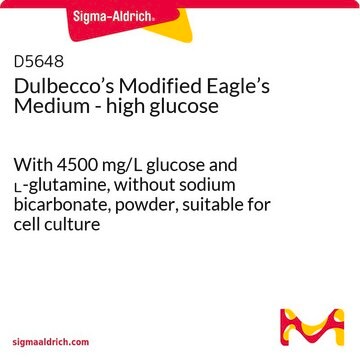D1145
DMEM - high glucose
With sodium bicarbonate, without ʟ-glutamine, sodium pyruvate, and phenol red, liquid, sterile-filtered, suitable for cell cutlure
Synonym(s):
DME, Dulbecco′s Modified Eagle′s Medium - high glucose, DMEM
About This Item
Recommended Products
Product Name
Dulbecco′s Modified Eagle′s Medium - high glucose, With 4500 mg/L glucose and sodium bicarbonate, without L-glutamine, sodium pyruvate, and phenol red, liquid, sterile-filtered, suitable for cell culture
Quality Level
sterility
sterile-filtered
form
liquid
technique(s)
cell culture | mammalian: suitable
impurities
endotoxin, tested
components
L-glutamine: no
sodium pyruvate: no
glucose: high
phenol red: no
NaHCO3: yes
HEPES: no
shipped in
ambient
storage temp.
2-8°C
Looking for similar products? Visit Product Comparison Guide
Application
Reconstitution
also commonly purchased with this product
supplement
Storage Class Code
12 - Non Combustible Liquids
WGK
WGK 1
Flash Point(F)
Not applicable
Flash Point(C)
Not applicable
Choose from one of the most recent versions:
Already Own This Product?
Find documentation for the products that you have recently purchased in the Document Library.
Customers Also Viewed
Protocols
Discover our primary human hepatocytes and plating and maintenance media formulations. Explore our protocol for plateable primary hepatocyte cell culture.
Discover our primary human hepatocytes and plating and maintenance media formulations. Explore our protocol for plateable primary hepatocyte cell culture.
Discover our primary human hepatocytes and plating and maintenance media formulations. Explore our protocol for plateable primary hepatocyte cell culture.
Discover our primary human hepatocytes and plating and maintenance media formulations. Explore our protocol for plateable primary hepatocyte cell culture.
Related Content
Explore our protocol for suspension primary hepatocyte cell culture. Discover our primary human hepatocytes and plating and maintenance media formulations.
Explore our protocol for suspension primary hepatocyte cell culture. Discover our primary human hepatocytes and plating and maintenance media formulations.
Explore our protocol for suspension primary hepatocyte cell culture. Discover our primary human hepatocytes and plating and maintenance media formulations.
Explore our protocol for suspension primary hepatocyte cell culture. Discover our primary human hepatocytes and plating and maintenance media formulations.
Our team of scientists has experience in all areas of research including Life Science, Material Science, Chemical Synthesis, Chromatography, Analytical and many others.
Contact Technical Service




